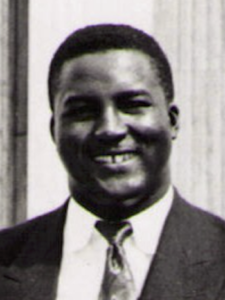
Julius W. Robertson
*Julius Winfield Robertson was born on this date in 1916. He was a Black lawyer, author, and civil rights activist.
Born in rural Georgia to a family of farmers, they relocated to Tennessee in search of better opportunities. In the early 1920s, he moved to Washington, DC, to escape the harsh realities of being a black man living in the Deep South. While attending Howard University in 1944, Robertson wrote about racism in America in his book titled 'This Bird Must Fly.' It formed the basis of his studies and his subsequent pursuit to remedy the inequitable treatment of African Americans in a system dominated by segregation and Jim Crow Laws. In 1948, Robertson graduated from Howard University with combined degrees (B.A. and LL.B.) at the top of his class. Today, he would have received the Order of the Coif because of his academic standing.
Having observed Robertson's career, the Harvard University Law School admissions committee offered him a full scholarship to pursue his LL.M. However, he was unable to accept the offer due to his young family. He and his classmate James Madison Nabrit, Jr. joined the ranks of renowned civil rights lawyers, such as the former U.S. Supreme Court Justice Thurgood Marshall, with whom they worked closely in his early years. Robertson, Nabrit, Jr., along with Attorney George E.C. Hayes, were deeply involved in the movement to dismantle segregation through the courts. Robertson was admitted to the bar in the District of Columbia, and is licensed to practice before the District of Columbia Court of Appeals, the U.S. District Court for the District of Columbia, the U.S. Court of Appeals for the District of Columbia, the U.S. Court of Claims, and the United States Supreme Court. He worked as a sole proprietor until he established the law firm of Robertson & Roundtree in 1952, serving as the senior and managing partner.
Robertson hired Attorney Dovey J. Roundtree, whom Roundtree credited as her mentor. He was known as a brilliant litigator, a distinguished civil rights activist, an author, a much sought-after speaker, and a well-respected member of the legal community in good standing. He was also the lead attorney on the 1955 precedent-setting case Sarah Keys v. Carolina Coach Company. Robertson was sponsored to argue other cases before the U.S. Supreme Court for the first time in 1952, then in 1954, 1959, and 1960, shortly before his untimely death in 1961. He was a member in good standing of the American Bar Association, one of its first ‘official’ Black members, the National Bar Association, and the District of Columbia Bar Association.
Robertson was recognized as a gifted intellectual with a broad knowledge of national and international geopolitics. As a constituent of Senator Estes Kefauver (D-Tenn.), Robertson had many appointments with him to discuss critical Civil Rights issues. During these meetings, Kefauver discovered that Robertson spoke, wrote, and read fluent German. He then asked if Robertson would be willing to research and gain background information for a bill he was sponsoring. Robertson reviewed the evidence presented during the Nuremberg War Crimes Tribunal, particularly regarding “Permissible Medical Experiments,” the standards used to judge the German doctors on trial at the time.
These became codified as the Nuremberg Code, which was used in part to establish “the requirements that all research participants be fully informed about potential risks or harm that may result from taking part in a study and that, based on this information, they voluntarily agree to participate.” After his death, using this standard, Sen. Kefauver and Rep. Oren Harris (D-Ark.) sponsored a bill that “established a framework that required drug manufacturers to prove scientifically that a medication was not only safe but effective.” This legislation became known as the Kefauver-Harris Amendment; President Kennedy signed it into law on Oct. 10, 1962.